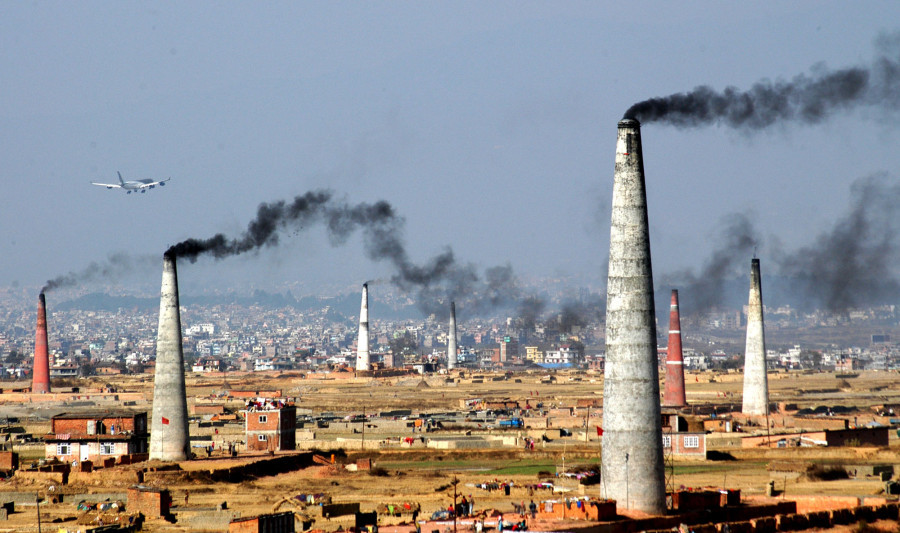National
Acute shortage of environment inspectors hampers monitoring
There are only 16 environment inspectors in the country and five of them are currently on study leave.
Chandan Kumar Mandal
The country is acutely understaffed in terms of keeping in check the environmental pollution and in ensuring strict compliance of environmental laws as only a few environment inspectors have been assigned for the countrywide job, government officials say.
The Department of Environment currently has just 16 environment inspectors, whose jobs involve minimising pollution and enforcing compliance with the laws made for the protection of the environment. To make things worse, five of the inspectors are currently abroad on study leave.
The limited number of inspectors has severely affected the work of the environment department.
“It is difficult to carry out works with a limited number of environment inspectors,” Govinda Lamichhane, one of the environment inspectors, told the Post.
The existing Environmental Protection Act, 2019 has a provision of appointing environment inspectors, whose responsibility is to inspect, examine and recommend measures to mitigate the impact of environmental pollution.
Environment inspectors are authorised to inspect the premises of concerned project sites, buildings, factories, equipment, vehicles and livestock to ensure whether environmental standards are being enforced.
The law also grants them the authority to examine whether development projects are being implemented as per the Environmental Impact Assessment (EIA) and how the measures suggested in the EIA reports were being applied.
Sindhu Prasad Dhungana, spokesperson for the Ministry of Forest and Environment, also agrees that a small number of environment inspectors is slowing down the department’s pollution monitoring tasks.
“They can only spend limited time while performing their inspection job, as there is a huge burden of work waiting for them,” Dhungana told the Post. “Even if they spend one day with one EIA report, it will take several months for them to check whether there has been compliance.”
The Environment Ministry has so far approved nearly 400 EIA reports of various projects across the country. Now, the department needs to visit these project sites to check their compliance with the various environmental standards.
According to Dhungana, the government should hire more environment inspectors to oversee development projects efficiently.
“But the government has been saying that they want to reduce the number of staff,” said Dhungana. “If the government wants to do that, then it should cut down the administrative staff. It should not decrease the number of technical officials.”
With the federal setup, even the provincial government can appoint environment inspectors for overseeing projects at their respective levels. The new amendment to the Environmental Protection Act allows provincial governments to hire environment inspectors.
“We need more environment inspectors at the provincial and local levels as the environmental impact will be felt more at the local levels,” said Dhungana. “If these governments are asked to conduct IEE and EIA report examinations and they do not hire environment inspectors, then it’s a case similar to building the hospitals without doctors.”
So far, some local levels have hired environment officers. However, they are not trained for the job. Instead, they have training for other disciplines such as arts and commerce, according to Dhungana.
At the time of amending the Environment Protection Act, stakeholders had demanded that the qualifications of environment inspectors should be clearly mentioned in the Act. According to them, these jobs should be for those who are trained in environmental science.
The government has not mentioned the qualifications in the Act, which they say will be clearly mentioned in regulations. The existing provision says that if an environment inspector is not available, any section officer can be appointed for the job.
However, the bigger problem lies in the pre-decided pay and perks for environment inspectors, which might discourage newcomers from joining the service.
Environment inspectors are hired as section officers with no possibility of promotion as per the civil service law which constitutes a total of 12 groups. Environment inspectors fall in the Nepal Miscellaneous Service group.
According to Dhungana, environment inspectors should be included in Nepal Forest Service group, which further has six sub-groups.
“There should be a provision for their promotion to other ranks as well. Likewise, their pay and perks should be regularly reviewed,” said Dhungana.
According to Lamichhane, the arrival of new environment inspectors is not currently possible as there are no vacancies at any level.
“There are only 16 positions at the centre, which are already occupied,” said Lamichhane. “The existing provisions can affect an appointed inspector’s performance. Some people might quit their jobs if they find a better opportunity.”




 20.12°C Kathmandu
20.12°C Kathmandu















